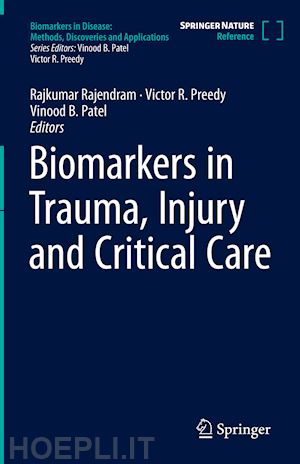
Questo prodotto usufruisce delle SPEDIZIONI GRATIS
selezionando l'opzione Corriere Veloce in fase di ordine.
Pagabile anche con Carta della cultura giovani e del merito, 18App Bonus Cultura e Carta del Docente
This handbook systematically presents biomarkers for traumatic injuries. The book covers topics such as traumatic brain injury, liver injury, burn severity, muscle heart damage, and acute inflammation in polytrauma and their detection by biomarkers.
Biomarkers and methods used in critical care and critically ill patients are discussed, as well as biomarkers in trauma and special conditions. Specific biomarker components are explained and models for modeling trauma in research are presented.
This systematic handbook is an excellent resource for researchers and specialists in trauma research and treatment, as well as clinicians and physicians who want a thorough overview of various injuries, trauma, and their detection methods.Biomarkers and outcomes: the example of traumatic brain injury.- Biomarkers in neurological injury: fibrinogen and beyond.- Biomarkers for liver injury: micro RNAS and beyond.- Biomarkers in muscle injury: proteomic and beyond.- Biomarkers in lung injury:.- Biomarkers and penetrating thoracic trauma.- Biomarkers in renal injury.- Biomarkers of heart muscle damage and injury: mRNA expression and beyond.- Biomarkers of burn severity.- Biomarkers and prognosis in sepsis: muscle mass and beyond.- Biomarkers of acute inflammation in polytrauma.- Electrolytes in critical care as a biomarker.- Critical care and 5'-Aminolevulinate synthase 2 (ALAS2) expression as a biomarker.- miRNAs as biomarkers of critically Ill patients.- C-Reactive protein and implications to the Neonatal Intensive Care Unit.- 129Xe magnetic resonance imaging (MRI) as a biomarker and implications for critical care.- Gas imaging of aeration and fractional ventilation as a biomarker in critical care.- Circulating PD-1/2B4 CD8+ T-cells patterns as biomarkers and the ICU.- Collagen and fibrotic biomarkers in critical care.- Biomarker mortality prediction model for sepsis in critical care: parsimonious modelling and beyond.- Acute kidney injury in critical care and biomarkers.- Platelet Function Assays in trauma.- Coagulation tests and fibrinogen concentrate in trauma.- Biomarkers and the time window-in trauma patients.- Inflammatory biomarkers in animal model of brain Injury.
Dr Rajkumar Rajendram AKC BSc (Hons) MBBS (Dist) MRCP (UK) EDIC FRCP Edin FRCP Lon CCT Internal Medicine (Acute), Anaesthesia and Intensive Care is a clinician scientist who has a focus on anaesthesia, intensive care and peri-operative medicine. Dr Rajendram graduated in 2001 with a distinction from Guy’s, King’s and St. Thomas Medical School, in London. As an undergraduate he was awarded several prizes, merits and distinctions in pre-clinical and clinical subjects.
Dr Rajendram began his post-graduate medical training in general medicine and intensive care in Oxford. He attained membership of the Royal College of Physicians (MRCP) in 2004 and completed specialist training in acute and general medicine in Oxford in 2010. Dr Rajendram also trained in anaesthesia and intensive care in London. During this training he obtained extensive experience in the management of trauma, toxicology and sepsis at the internationally renowned major trauma centres of the Royal London Hospital and the Oxford University Hospitals. He was awarded fellowship of the Royal College of Anaesthetists (FRCA) in 2009 and fellowship of the Faculty of Intensive Care Medicine (FFICM) in 2013. He was awarded the European diploma of intensive care medicine (EDIC) and completed specialist training in anaesthesia and intensive care in 2014. In 2017 he became a fellow of the Royal College of Physicians (FRCP), Edinburgh and then became a FRCP, London in 2019.
Dr Rajendram returned to Oxford as a Consultant in the Department of Acute General Medicine at the John Radcliffe Hospital, Oxford. The UK National Spinal Cord Injury Centre is based at Stoke Mandeville Hospital, Aylesbury where Dr Rajendram subsequently thrived as a Consultant in the Department of Anaesthesia and Intensive Care. He is currently a Consultant in the Department of Medicine at King Abdulaziz Medical City, National Guard Heath Affairs, Riyadh, Saudi Arabia. This is theleading major trauma centre in Saudi Arabia. To improve the outcomes of victims of major trauma, Dr Rajendram recently developed a novel medical-surgical co-management service (i.e. peri-operative medicine) for this complex cohort that is at high risk of morbidity and mortality.
As a clinician scientist Dr Rajendram has also devoted significant time and effort into research and education. He is a joint appointment Assistant Professor in the College of Medicine, King Saud bin Abdulaziz University for Health Sciences, Riyadh, Saudi Arabia and has published over 300 textbook chapters, review articles, peer-reviewed papers and abstracts many of which are related to the pathogenesis, investigation and treatment of disease which includes critical care, and trauma. He is lead Editor on the books Diet and Nutrition in Critical Care, the Neuroscience of Traumatic Brain Injury and the Neuroscience of Spinal Cord Injury.











Il sito utilizza cookie ed altri strumenti di tracciamento che raccolgono informazioni dal dispositivo dell’utente. Oltre ai cookie tecnici ed analitici aggregati, strettamente necessari per il funzionamento di questo sito web, previo consenso dell’utente possono essere installati cookie di profilazione e marketing e cookie dei social media. Cliccando su “Accetto tutti i cookie” saranno attivate tutte le categorie di cookie. Per accettare solo deterninate categorie di cookie, cliccare invece su “Impostazioni cookie”. Chiudendo il banner o continuando a navigare saranno installati solo cookie tecnici. Per maggiori dettagli, consultare la Cookie Policy.